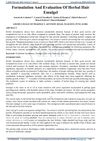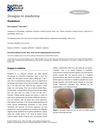 66 citations,
January 2017 in “Acta dermato-venereologica”
66 citations,
January 2017 in “Acta dermato-venereologica” Isotretinoin's effects and side effects, like birth defects and depression, might be due to it causing cell death in various cells.
 February 2024 in “International Journal of Biological Macromolecules”
February 2024 in “International Journal of Biological Macromolecules” The study created a new type of microsphere that effectively regrows hair.
 3 citations,
March 2014 in “Turkderm”
3 citations,
March 2014 in “Turkderm” Hair loss in men can be slowed or reversed with treatments like minoxidil and finasteride, but it resumes if treatment stops. It may also indicate early heart disease and obesity.
 12 citations,
November 2014 in “PLOS Computational Biology”
12 citations,
November 2014 in “PLOS Computational Biology” The study concluded that hair growth in mice is regulated by a stable interaction between skin cell types, and disrupting this can cause hair loss.
December 2019 in “Global pharmaceutical sciences review” New treatments for alopecia are being explored due to the limitations of current options.
 August 2023 in “Journal of The American Academy of Dermatology”
August 2023 in “Journal of The American Academy of Dermatology” Low-dose oral minoxidil is safe for treating hair loss, especially in women, with side effects stopping after use ends.
 May 2023 in “Journal of contemporary medicine”
May 2023 in “Journal of contemporary medicine” Using Favipiravir, a COVID-19 treatment drug, likely doesn't cause hair loss.
 5 citations,
February 2013 in “Klinik Psikofarmakoloji Bulteni-bulletin of Clinical Psychopharmacology”
5 citations,
February 2013 in “Klinik Psikofarmakoloji Bulteni-bulletin of Clinical Psychopharmacology” A teenager lost hair due to fluoxetine and sertraline, but it grew back after stopping these drugs and switching to a different one.
 September 2020 in “Journal of Cutaneous Pathology”
September 2020 in “Journal of Cutaneous Pathology” A patient with a skin condition had unusual scarring hair loss but improved with treatment.
 1 citations,
February 2017 in “Journal of pharmacology & clinical research”
1 citations,
February 2017 in “Journal of pharmacology & clinical research” The herbal hair gel with Eclipta alba and Lippia nodiflora extracts was more effective at growing hair than the control gel and minoxidil.
October 2017 in “Planta medica international open” Public education should promote the careful use of Turkish medicinal plants for skin diseases.

Oral contraceptives may cause significant hair loss in women.
 January 2024 in “International Ayurvedic medical journal”
January 2024 in “International Ayurvedic medical journal” Certain Prakruti types are more prone to early male pattern baldness.
 48 citations,
December 2013 in “Drug Delivery and Translational Research”
48 citations,
December 2013 in “Drug Delivery and Translational Research” Niosomes improve minoxidil skin penetration for hair loss treatment.
 February 2020 in “Journal of emerging technologies and innovative research”
February 2020 in “Journal of emerging technologies and innovative research” The herbal hair emulgel was effective and stable for promoting hair growth, reducing dandruff, controlling hair fall, and preventing greying.
 4 citations,
June 2017 in “Endocrine Reviews”
4 citations,
June 2017 in “Endocrine Reviews” Dihydrotestosterone (DHT) mainly affects nearby cells, doesn't significantly change prostate hormonal environment or cancer risk, and doesn't play a main role in causing hair loss or acne. More research is needed on its effects on heart health, sexual function, and bone health.
 32 citations,
November 2011 in “International Journal of Dermatology”
32 citations,
November 2011 in “International Journal of Dermatology” Diagnose and manage CCCA with thorough history, exams, and labs; treat with anti-inflammatory agents, stress reduction, and stopping harmful hair practices.
30 citations,
October 2013 in “BMC dermatology” VEGF gel increases hair growth but may have potential toxicity.
 3 citations,
November 2022 in “Facial plastic surgery & aesthetic medicine”
3 citations,
November 2022 in “Facial plastic surgery & aesthetic medicine” Using ultrasound to guide temple filler injections improves safety and accuracy.
 April 2024 in “Medical & clinical research”
April 2024 in “Medical & clinical research” More research is needed to find the best long-term treatments for Alopecia Areata.
 March 2023 in “JIIS (Jurnal Ilmiah Ibnu Sina): ilmu farmasi dan kesehatan”
March 2023 in “JIIS (Jurnal Ilmiah Ibnu Sina): ilmu farmasi dan kesehatan” The best biotin hair tonic formula has 20% span 80, 9.47% tween 80, and 5% PEG 400.

Tissue from dog stem cells helped grow hair in mice.
 32 citations,
April 2017 in “Scientific Reports”
32 citations,
April 2017 in “Scientific Reports” Platelet-rich plasma can help grow more mouse hair follicles, but it doesn't work for human hair follicles yet.
69 citations,
February 2008 in “The American journal of pathology” Controlled delivery of specific RNA and IL-4 restored hair growth in mice with autoimmune alopecia.
 3 citations,
December 2023 in “Cell proliferation”
3 citations,
December 2023 in “Cell proliferation” Stuff from umbilical cord stem cells helps skin heal and look younger.
 January 2013 in “The Pan African medical journal”
January 2013 in “The Pan African medical journal” Monilethrix causes short, fragile hair with no specific treatment available.
 November 2024 in “Journal of Translational Internal Medicine”
November 2024 in “Journal of Translational Internal Medicine” Exosomes from stem cells help hair regrowth by activating a specific signaling pathway.
 July 2020 in “International journal for research in applied science and engineering technology”
July 2020 in “International journal for research in applied science and engineering technology” The herbal shampoo made from local plants can reduce hair loss and promote hair growth.
 April 2017 in “Plastic surgical nursing”
April 2017 in “Plastic surgical nursing” Platelet-rich plasma (PRP) is an effective treatment for hair loss that involves scalp injections and requires ongoing maintenance.
 March 2019 in “Nasza Dermatologia Online”
March 2019 in “Nasza Dermatologia Online” A rare scalp condition with hair loss was correctly diagnosed and treated, leading to hair regrowth.

























